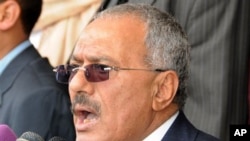Yemeni President Ali Abdullah Saleh has accepted an invitation from the six-nation Gulf Cooperation Council to hold talks in Saudi Arabia with opposition representatives who want him to step down.
Some opposition groups Tuesday welcomed the talks, but many were non-committal. A senior official with one of the larger anti-government parties said Mr. Saleh's opponents would be open to discussions, but only if they focus on the "immediate transfer of power."
Many in the capital, Sana'a, view GCC intervention as potentially significant and see the group as having more leverage over key Yemeni political figures than Western countries.
The European Union's foreign policy chief Catherine Ashton issued a statement Tuesday saying Yemen's political transition "must begin without delay." The U.S. echoed that call.
Pentagon spokesman Geoff Morrell said Washington has no intention of stopping its military aid to Yemen despite the unrest. He said support for Yemeni counter-terrorism efforts is essential because of the "real threat" from al-Qaida in the country.
These developments came as violence erupted in Yemen for a third straight day. A shootout broke out between troops supporting protesters and tribesmen loyal to Mr. Saleh in Sana'a, killing three people. General Ali Mohsen al-Ahmar, who turned against the Saleh government last month, said the incident was an attempt to assassinate him.
Several Yemeni military leaders have recently withdrawn support for Mr. Saleh and are siding with demonstrators, as pressure mounts for the longtime president to leave office.
In the southern city Taiz, plainclothes security men opened fire and launched tear gas at protesters again on Tuesday. Dozens were wounded, mostly suffering from tear gas inhalation.
At least 15 people were killed on Monday during anti-Saleh protests in Taiz. The escalating protest comes as international calls intensify for Mr. Saleh's resignation.
The office of the United Nations High Commissioner for Human Rights expressed alarm at what it terms "reports of disproportionate and excessive use of force, including machine guns, against peaceful protesters in Taiz" on Monday.
The New York Times reported that the United States is dropping its longtime support for Mr. Saleh and negotiating the terms of his departure. The State Department would not confirm the reports.
A Yemeni opposition spokesman said U.S. and European diplomats were in contact with Mr. Saleh and also asked anti-government leaders for their "vision" for a transition. The opposition Saturday gave U.S. officials a proposal that Mr. Saleh resign immediately and hand over power to a temporary government led by Vice President Abd al-Rab Mansur al-Hadi until new elections are held.
The Yemeni president, in power for 32 years, has offered to step down but only after new elections are held. His term ends in 2013.
Some information for this report was provided by AP, AFP and Reuters.




